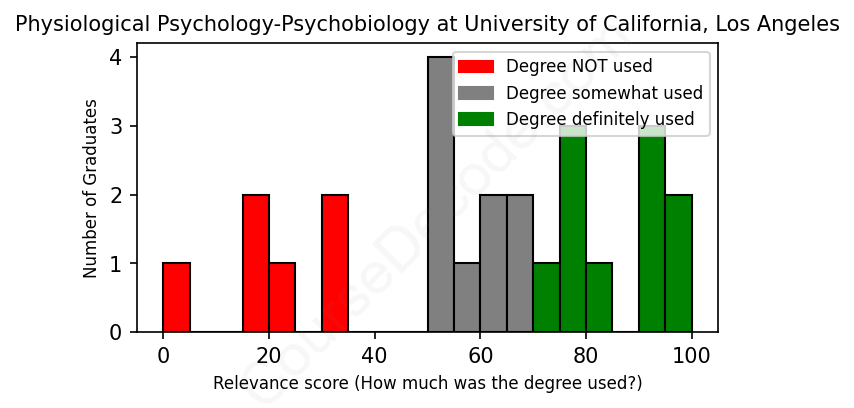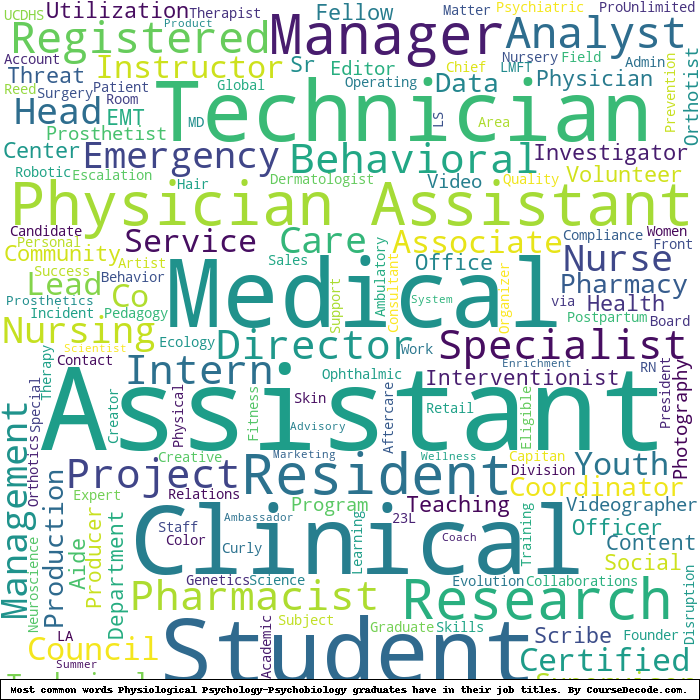
First, some facts. Of the Physiological Psychology-Psychobiology graduates from University of California, Los Angeles we've analyzed , here's how many have used (or NOT used) their degree in their career:

These are estimates based on AI analysis of 25 LinkedIn profiles (see below).
The verdict? Below average. Overall, with an average relevance score of 60%, Physiological Psychology-Psychobiology graduates from University of California, Los Angeles have a lower likelihood (-7%) of finding work in this field compared to the average graduate across all fields:
And for comparison, here's the chart for all profiles we've looked at across all degrees.
Also, after graduating, 60% of these graduates have pursued further education other than another Bachelor's degree (such as a Masters degree or other), compared to the average across all profiles of 35%. This suggests you may need more than just a Bachelors degree to be competitive as a Physiological Psychology-Psychobiology graduate.
See the details:
|
Relevance score: 31% We think this person has NOT gone into a career related to their degree. We think this person has NOT gone into a career related to their degree.
DEGREE INFOGraduated in 2022 from University of California, Los Angeles with a Bachelor of Science - BS in Physiological Psychology-Psychobiology. No other secondary education since. JOB HISTORY SINCE GRADUATIONStaff ruts dance studio May 2022 - Sep 2022 Head of Production  Kumu Jan 2022 - Oct 2022 Director Of Photography  Kumu Jan 2022 - Oct 2022 Director Of Photography  One Down Jan 2022 - Jun 2022 Head of Production  One Down Jun 2022 - Oct 2022 Artist Videographer  88RISING Oct 2022 - Dec 2022 Video Editor  Jubilee Media Dec 2022 - Jan 2023 Video Editor  DarkZero Esports Dec 2022 - Jan 2023 Admin Videographer  Foundations Choreography Jul 2022 - May 2023 Content Production  Freelance Oct 2022 - Aug 2023 Creative Producer  byPIVOT Apr 2023 - Dec 2023 Producer  Open Call Jan 2024 - Present Division Head  Ronin House Feb 2023 - Present ABOUTmoving teams and projects forward, building the means for creatives to do what they love. the journey to live sustainably as a creative is difficult, im hoping to make it a bit easier. |
The top 10 most common jobs done by the graduates we've analyzed (ranked most common to least) are:
When looking at the job landscape for graduates with a degree in Physiological Psychology-Psychobiology from UCLA, there's a pretty diverse mix of career paths. A lot of individuals have gravitated towards healthcare roles, like being EMTs, medical assistants, or even resident physicians, where their educational background in psychology and biology comes into play significantly. These positions often require a solid understanding of human behavior and physiological processes, so it makes sense that graduates find relevance in them. However, there are also quite a few who have ventured into fields that don't seem directly connected to their studies, such as project management, technical roles, or even film production, where psychological principles don't play a major role in daily responsibilities.
Overall, while many graduates end up in roles where they can apply their knowledge of physiological psychology and psychobiology — particularly in healthcare settings — a considerable number find themselves in jobs that are not very relevant to their studies. The trend shows that while the degree offers valuable insights into human behavior that can be applied across various fields, the direct application of that knowledge isn't always the focus in many positions. So, it’s a mix of both relevance and deviation when it comes to the job trajectories of these grads!
Here is a visual representation of the most common words in job titles for Physiological Psychology-Psychobiology graduates (this is across all Physiological Psychology-Psychobiology graduates we've analyzed, not just those who went to University of California, Los Angeles):

When you look at the career paths of graduates from UCLA with a degree in Physiological Psychology-Psychobiology, you'll see a mix of experiences that can be quite enlightening. For the most part, many of these grads land their first jobs in healthcare-related fields, often starting out as interns or in assistant roles. For instance, several have taken up positions as pharmacy interns, medical assistants, or EMTs right after graduating. It’s clear that the hands-on experience in medical or clinical settings is a common theme. This is helpful for those who want to get a foot in the door in the medical world or related fields, sometimes leading to advanced roles if they pursue further education or training in areas like pharmacy or medicine.
Fast forward five or ten years later, many graduates progress into more specialized and higher-level positions. We see individuals becoming pharmacists, physicians, or directors at educational institutions. Some even dive deep into research or academia, contributing to important studies and clinical practices. However, it’s also important to note that not everyone stays strictly within the realm of Physiological Psychology-Psychobiology. There are graduates who veer off into other areas, including tech and project management, which may not directly relate to their degree. While many find rewarding careers closely tied to their studies, some take winding paths that may not leverage their educational background as directly as you might expect. Overall, it looks like a solid mix of careers that do yield good results for many, but it's a diverse field with various trajectories depending on individual choices and opportunities.
Honestly, a Bachelor’s degree in Physiological Psychology-Psychobiology at UCLA is pretty challenging, mostly because it dives deep into both psychology and biology, which means you’ll be handling a lot of complex concepts and scientific research methods. You’ll be taking some tough courses in statistics, neuroscience, and experimental psychology, all of which can get pretty intense. Plus, UCLA is a competitive school, so you'll be surrounded by other motivated students pushing themselves, which can add to the pressure. That said, if you’re genuinely interested in the brain and behavior, it can be super rewarding and often engaging, but be prepared to put in some solid effort and late-night study sessions! Overall, it’s definitely on the harder side of the spectrum compared to some other degrees, so just be ready for that!
Most commonly, in the LinkedIn profiles we've looked at, it takes people 4 years to finish a Bachelor degree in Physiological Psychology-Psychobiology.
Looking at these UCLA grads and their job trajectories, it seems like some have really found their footing and likely make decent money. For instance, the pharmacist from the 2010 class has progressed through several roles at Kaiser Permanente, which usually pays pretty well, especially at the pharmacist level. The folks in medical and research roles, like the dermatologist and the co-founder of a health tech startup, are probably making solid salaries too, given the demand for their skills. On the flip side, some of the recent graduates, especially those in education and community services, might not be bringing in as much, but they’re likely gaining invaluable experience. Overall, it looks like a mixed bag, but plenty seem to be on a good financial path!
Here is a visual representation of the most common words seen in the "about" section of LinkedIn profiles who have a Bachelor degree in Physiological Psychology-Psychobiology (this is across all Physiological Psychology-Psychobiology graduates we've analyzed, not just those who went to University of California, Los Angeles). This may or may not be useful:

Here are all colleges offering a Bachelor degree in Physiological Psychology-Psychobiology (ordered by the average relevance score of their Physiological Psychology-Psychobiology graduates, best to worst) where we have analyzed at least 10 of their graduates:
| College | Score | Count |
|---|---|---|
 University of California, Los Angeles University of California, Los Angeles
|
60 | 25 |